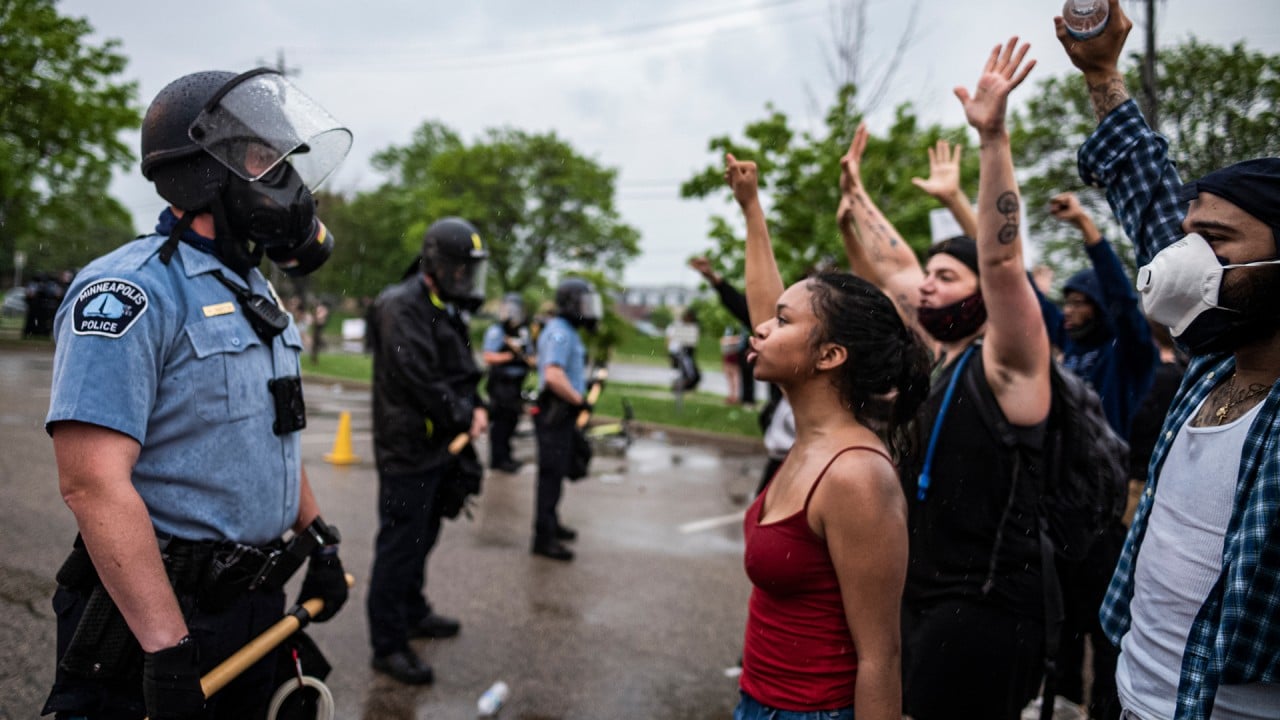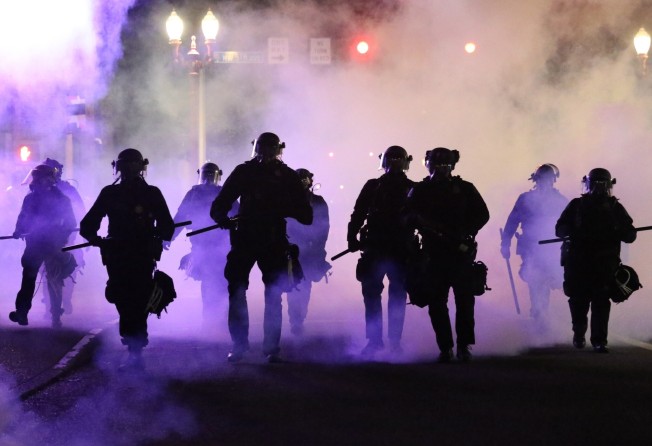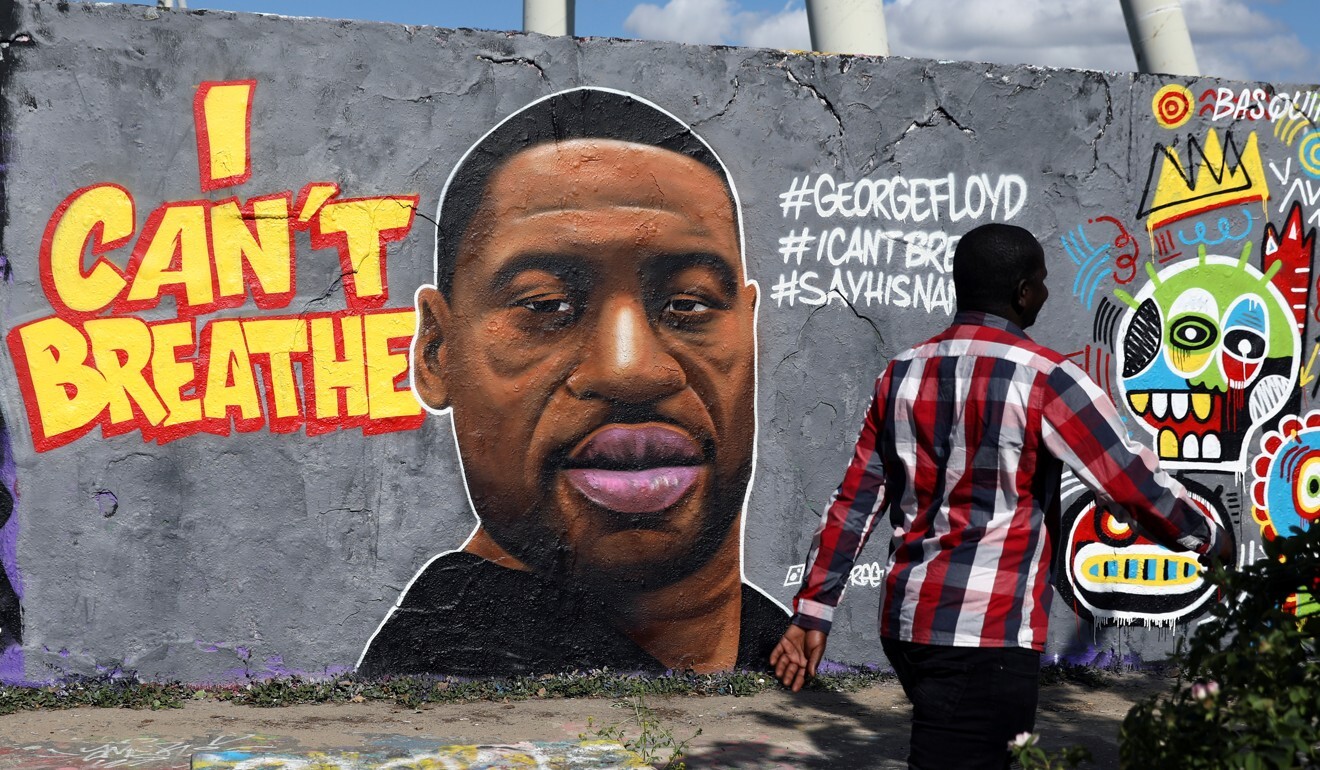
02:06
Protesters in the US demand justice for the death of George Floyd after fatal arrest

Flames light up the skyline and the smell of acrid smoke fills the streets in a Minneapolis neighbourhood rocked by protest, a few hundred meters from a besieged police station.
“The real reason we’re here is because the police keep killing black folk all around the United States,” says a young African-American man who declined to be named.
His face covered by a mask – whether because of the coronavirus or to protect against tear gas it’s not clear – he says he came to protest peacefully on Friday with friends, despite a curfew imposed after three nights of rioting.
And as flames from a bank lick upwards nearby, the young man explains the anger seething across the country since the death of George Floyd on Monday at the hands of an officer who pinned him to the ground handcuffed and knelt on his neck for more than five minutes.
“We’re in 2020 and we’re dealing with the same problem that we were dealing with in the 60s … it looks like Minneapolis finally reached that breaking point”
“George Floyd isn’t the first,” adds Jerry, 29, who is white. “What are you supposed to do, just sit back and take it?”
More than a thousand people died after being shot by police last year in the US, according to The Washington Post. Black people are over-represented in police shootings and condemnation is rare.

02:06
Protesters in the US demand justice for the death of George Floyd after fatal arrest
In Floyd’s case, Derek Chauvin, the officer shown kneeling on his neck in footage of the incident was charged on Friday with third degree murder – unintentionally causing a death – and negligent manslaughter.
“This case is now ready, and we have charged it,” said county prosecutor Mike Freeman as outrage grew over the latest death of an African-American in police custody.
Floyd’s relatives – who spoke on Friday with President Donald Trump – welcomed news of the officer’s arrest as a “step on the road to justice.”
But they said they hoped for tougher charges and action against the other officers involved in Floyd’s detention and death.
“We want a first-degree murder charge. And we want to see the other officers arrested.
“The pain that the black community feels over this murder and what it reflects about the treatment of black people in America is raw and is spilling out onto streets across America,” they said in a statement.
Former vice-president Joe Biden, who is challenging Trump for the White House in November’s election, also spoke to Floyd’s family.
He called for justice and said it was time to heal the “open wound” of systemic racism in the United States.
Freeman said the three other officers present when Floyd died were also under investigation, and that he anticipated charges would be laid against them.
All four were fired from the police department on Tuesday after video surfaced of the arrest.
But the charges failed to calm a shaken nation whose deep wounds over racial inequality have been torn open anew, with riots raging from New York to Los Angeles in one of the worst nights of civil unrest in years.

In Atlanta, police cruisers were attacked and set ablaze as rallies spun out of control, while in the capital Washington protesters collided with Secret Service agents in heated midnight scenes in front of the White House.
Protests took hold in a swathe of cities including Boston, Dallas, Denver, Des Moines, Houston, Las Vegas, Memphis, and Portland.
In Minneapolis on Friday night, helicopters flew overhead as protesters faced off against police and explosions echoed through the streets.
“It’s scary but necessary at the same time,” says one young student, “sometimes things need to get bad before getting better.”
Others, however, are not so sure: “They are making it worse, they give them (the police) a reason to shoot us,” says thirty-four-year-old Phae, a black woman who lives nearby and is clearly exhausted.
“I sympathised completely but I don’t want to lose all my stuff,” says a young woman who lives above a barricaded shop and is scared it could be set on fire.
The local authorities were conciliatory in the first days of the protests, but have since called in the National Guard and stiffened their tone.
“There is no honour in burning down your city,” said the mayor of Minneapolis, Jacob Frey, at an improvised news conference held soon after midnight. “It needs to stop.”
Some of the shops gutted by fire are owned by black families, added Minnesota Governor Tim Walz: “This is not about George’s death. This is not about inequities that were real. This is about chaos.”
But that view was not shared on the streets. “I need you to look in my eyes and feel me,” said protester Naeema Jakes. “This is pain, this is hurt.”